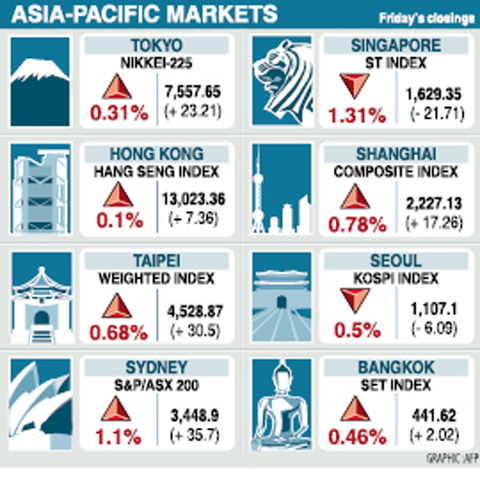US stocks ended a turbulent week by plunging to six-year lows amid concerns over ailing financial institutions and their prospective nationalization.
The Dow Jones Industrial Average fell a hefty 6.17 percent over the week to its lowest level since October 2002 at 7,365.67 on Friday, dogged by concerns that key banks such as Bank of America and Citigroup will be taken over by the government. The tech-rich NASDAQ composite fell 6.07 percent over the week to 1,441.23 and the broad-market Standard & Poor’s 500 tumbled 6.87 percent to 770.05.
The market continued to falter even after US President Barack Obama signed a bill for a nearly US$800 billion economic stimulus package and unveiled a multibillion dollar plan to contain a home mortgage crisis at the epicenter of global financial turmoil.

Investors zeroed in on the financial stocks amid concerns over bad assets troubling banks and rumors over their nationalization which the Obama administration moved to dispel.
“Financial stocks continue to represent the biggest concern for the broader market, and will continue to do so in the coming week,” Briefing.com said.
Uncertainty remain “regarding the depth and duration of the global recession and exacerbated fears that more pain and restructuring may lie ahead for the financial sector,” analysts at Charles Schwab & Co said in a report.
“It may take quite a bit more policy force to break the back of the recession” that has gripped the US for the past year, economists at IHS Global Insight wrote.
The US government is scheduled to release in the coming week a preliminary GDP projection for the fourth quarter of last year — the second update on economic activity for the quarter. Most economists surveyed expect that GDP in the quarter fell 5.4 percent, subsequent to receiving revisions to data after the first reading of negative 3.8 percent.
The GDP decline “is expected to be more severe than previously reported,” IHS Global Insight said.
Other fresh data to be released next week “will not do much to allay” concerns over the economy, it said. Among others, consumer confidence measures for this month as a whole are expected to sink and total new and existing home sales are expected to have declined last month, the market analysis firm said.

EUROPEAN TARGETS: The planned Munich center would support TSMC’s European customers to design high-performance, energy-efficient chips, an executive said Taiwan Semiconductor Manufacturing Co (TSMC, 台積電), the world’s largest contract chipmaker, yesterday said that it plans to launch a new research-and-development (R&D) center in Munich, Germany, next quarter to assist customers with chip design. TSMC Europe president Paul de Bot made the announcement during a technology symposium in Amsterdam on Tuesday, the chipmaker said. The new Munich center would be the firm’s first chip designing center in Europe, it said. The chipmaker has set up a major R&D center at its base of operations in Hsinchu and plans to create a new one in the US to provide services for major US customers,

The Ministry of Transportation and Communications yesterday said that it would redesign the written portion of the driver’s license exam to make it more rigorous. “We hope that the exam can assess drivers’ understanding of traffic rules, particularly those who take the driver’s license test for the first time. In the past, drivers only needed to cram a book of test questions to pass the written exam,” Minister of Transportation and Communications Chen Shih-kai (陳世凱) told a news conference at the Taoyuan Motor Vehicle Office. “In the future, they would not be able to pass the test unless they study traffic regulations

‘A SURVIVAL QUESTION’: US officials have been urging the opposition KMT and TPP not to block defense spending, especially the special defense budget, an official said The US plans to ramp up weapons sales to Taiwan to a level exceeding US President Donald Trump’s first term as part of an effort to deter China as it intensifies military pressure on the nation, two US officials said on condition of anonymity. If US arms sales do accelerate, it could ease worries about the extent of Trump’s commitment to Taiwan. It would also add new friction to the tense US-China relationship. The officials said they expect US approvals for weapons sales to Taiwan over the next four years to surpass those in Trump’s first term, with one of them saying

‘COMING MENACINGLY’: The CDC advised wearing a mask when visiting hospitals or long-term care centers, on public transportation and in crowded indoor venues Hospital visits for COVID-19 last week increased by 113 percent to 41,402, the Centers for Disease Control (CDC) said yesterday, as it encouraged people to wear a mask in three public settings to prevent infection. CDC Epidemic Intelligence Center Deputy Director Lee Chia-lin (李佳琳) said weekly hospital visits for COVID-19 have been increasing for seven consecutive weeks, and 102 severe COVID-19 cases and 19 deaths were confirmed last week, both the highest weekly numbers this year. CDC physician Lee Tsung-han (李宗翰) said the youngest person hospitalized due to the disease this year was reported last week, a one-month-old baby, who does not